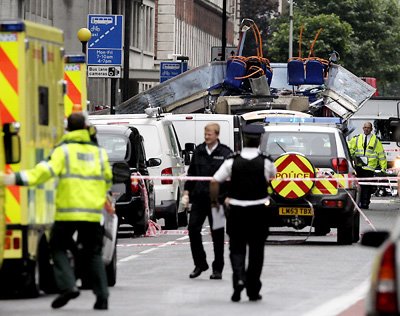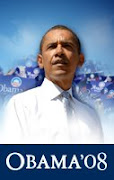Speaking for the first time, father of the London bus bomber reveals his anguish
 As London prepares for tomorrow - the first anniversary of the 7-7 bombings - the BBC are about to show a remarkable documentary in which a British Muslim who's partner died in the bombings challenges the parent of one of the suicide bombers.
As London prepares for tomorrow - the first anniversary of the 7-7 bombings - the BBC are about to show a remarkable documentary in which a British Muslim who's partner died in the bombings challenges the parent of one of the suicide bombers.
Gous Ali, whose partner Neetu Jain died when Mahmood Hussain's son blew up a bus in London one year ago, approached the father of the bomber in person - having written to him and elicited no response - and certainly didn't mince his words.
"Do you know who I am?" he asked. "Your son killed my partner."At first the Hussain family are outraged that they have been approached in this way, and I have to say they have a point, but as Mr Ali presses on, Mahmood Hussain's emotion's spill out.
And it strikes you that the parents of the suicide bombers are also caught in a horrendous trap, unable to believe that their baby would be capable of such an atrocity whilst simultaneously attempting to come to terms with their horrific loss."Forgive me, but it's no good just coming in and saying your son killed my partner," Mr Hussain said. "We are the victims, too - and in the same position as you are. I tell you the truth. I can't say I sympathise with you with your situation because there's no words can replace your loss; no sympathy can do that.
"But we are decent people. I worked hard all my life. Please, please, please don't say it's something to do with me, or that I knew, my son knew, my wife knew. We are very, very decent people. I think it must have been somebody else on the bus. Not Hasib. He was a good boy. There's not a shred of evidence that he was involved in it."
It is this inability to accept the terrible truth that has led Mr Hussein to speculate that perhaps black ops carried out the operation to test London's defences or to foment anti-Muslim feeling. Anything other than to face the truth.
"We are grieving for the relatives of the 52 victims as well," he concluded.
It was the closest he came to an apology and, with that, Mr Ali shook hands with the bomber's father and brother and took his leave.
Mr Ali said he still felt "a huge emptiness" after a conversation in which Mr Hussain "talked more about his loss and his situation than mine." Despite nightmares about exacting revenge on the Hussains he found himself "standing next to this chap to whom I could not be impolite and who I... ended up counselling."
He said: "When it came down to it, I just could not bear to be horrible to him."
There's something profound, touching and humane about that. In the end, face to face with the man with whom he had hoped to vent his rage and take his revenge, Mr Ali came across another human being in pain and found he simply couldn't carry through his intentions.
Anger is a legitimate part of the grieving process and we all like to have a focus for that anger. Mr Ali seems to have decided that, in his case, the focus for his anger would be the father of the boy who killed his partner. How wonderful that he realised so quickly the futility of that course of action.
Anyone who has experienced a profound loss, which I have, knows that for the first two years your heart is like an open wound, capable of great tenderness but also capable of ferocious anger.
Mr Ali writes an open letter in which he gives his account of the meeting.
Human beings are wonderful creatures.I found him in a state of profound denial. "No one has shown me any evidence that he did it. I've seen nothing. No DNA. No evidence," he said. But in the same breath, he told me that if he knew his son could do such a thing, he would "break his legs". He told me he would have "put him in prison" or done "something horrible to him to stop him". I could see now, in his eyes, that he was torn apart over how the boy he had raised for the past 18 years had planned and executed an atrocity while living under his roof.
As I left, he continued talking; asking where I had come from and if I would be coming back, saying maybe we could talk again. But there was no point staying. Hasib's father was too angry and I felt like I wasn't going to get the answers I needed.But I think I might [take up his offer] to meet again. I feel I have a role in this man's life, to help him understand. Above all I feel pity for this family. I've lost someone quite amazing in my life but I've got something beautiful to hold on to. They have only a nightmare.
Click title for full article.






No comments:
Post a Comment